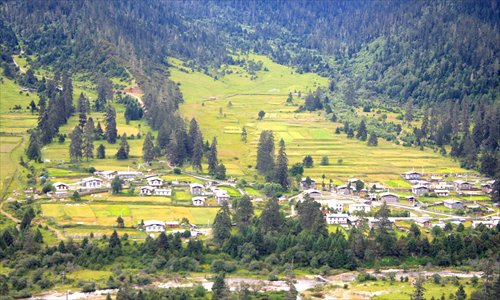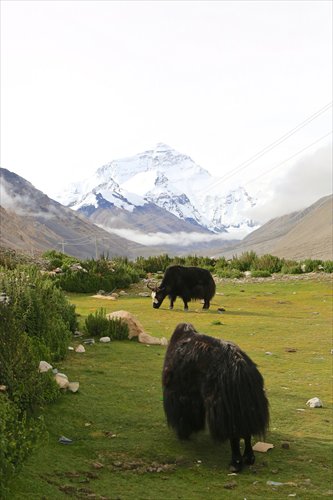

A village in Linzhi prefecture. Photo: Courtesy of Hu Wei

A black yak eats grass in South Tibet. Photo: Courtesy of Hu Wei
The Sherpa language is different from the language spoken in Lhasa, and the people are famous for being elite mountaineers and guides for people who want to explore the Himalayan regions.
"People can also meet the Manba and Lhoba ethnic minorities. Their customs and clothes are different from the Tibetan ethnic minority," noted Lei.
Lei's most dangerous experience in southern Tibet was being bitten by two dogs.
"There was no medical center for me to receive injections. So I used baijiu (traditional Chinese liquor) to disinfect the wounds on my back," Lei said.
Religious discoveries
Hu Wei is not religious, but this did not prevent the 35-year-old Beijing designer from coming to southern Tibet to take a pilgrimage to Mount Kailash, a sacred place for four religions: Tibetan Bon Buddhism, Buddhism, Hinduism and Jainism.
Chinanews.com reported in September that China will open the Nathu La Pass for people coming from India to go on pilgrimages to Tibet.
Hu spent two days walking around the mountain and climbing to the top. The contentment and piety of the believers moved him.
"Many of their heads have a heavy bump from kowtowing. They also eat very little. But they seem so happy and their smiles are so bright," Hu said.
Hu used to be bothered by his complicated life, but on the pilgrimage he had time to contemplate himself and those around him. "It's a form of purification for your mind and soul," he told Metropolitan.
Down the mountain, he met an old Buddhist in her 70s. He helped her carry a 10-kilogram bag for about 300 meters. When they said goodbye, the woman and Hu put their heads together as a form of farewell and thanks.
"It wasn't a big thing. But their simplicity can affect you," Hu said.
Tough but rewarding
For most travelers, Motuo county is attractive because it is both beautiful and intimidating, the latter due to its dangerous road.
Ifeng.com reported in September 2013 that a 24-year-old woman went missing in Motuo, and every year the local rescue team is sent to retrieve hikers two to three times.
"Between June and August, there will be heavy mud-rock flows," said Hu, who went to Motuo in September.
It rained every day when Hu visited. He met some other travelers there and they formed a travel group.
"In some landslide areas, one person has to go first to test and to avoid any possible dangers," Hu said. "But in that place you can experience the beauty of four seasons. On the top of the mountains, there is snow and snow lotus flowers. At the foot of the mountain, the weather is different. And there are hundreds of little waterfalls among the mountains.
Hu noted that it is easy for women to get a ride in Tibet but it is still necessary to be careful.
"If you want to go to the south end of Tibet, you need to get a frontier pass. Those places are so rarely visited, it's like heaven," he said.
Norbu told Metropolitan that travelers don't need to feel threatened by the occasional reports of disputes between China and India in that area causing danger for travelers. "There are checkpoints installed and travelers won't be able to go so near the border."
Yang said that he still vividly remembers the taste of Tibetan food. His favorite dish is the black yak. "They just boil it. With no other ingredients, the sweetness of the meat is so overwhelming. I have never tasted meat that delicious in Beijing," he said.
Yang is already planning to visit the region again. This time he is considering going to the southern end of Tibet, where one of his favorite poets, Tsangyang Gyatso, once lived.
Scenery of Lake Rakshastal in SW China‘s Tibet
2014-11-02Scenery of tidal wetland in China‘s Tibet
2014-10-30Wildlife protection in China‘s Tibet
2014-10-27Copyright ©1999-2018
Chinanews.com. All rights reserved.
Reproduction in whole or in part without permission is prohibited.